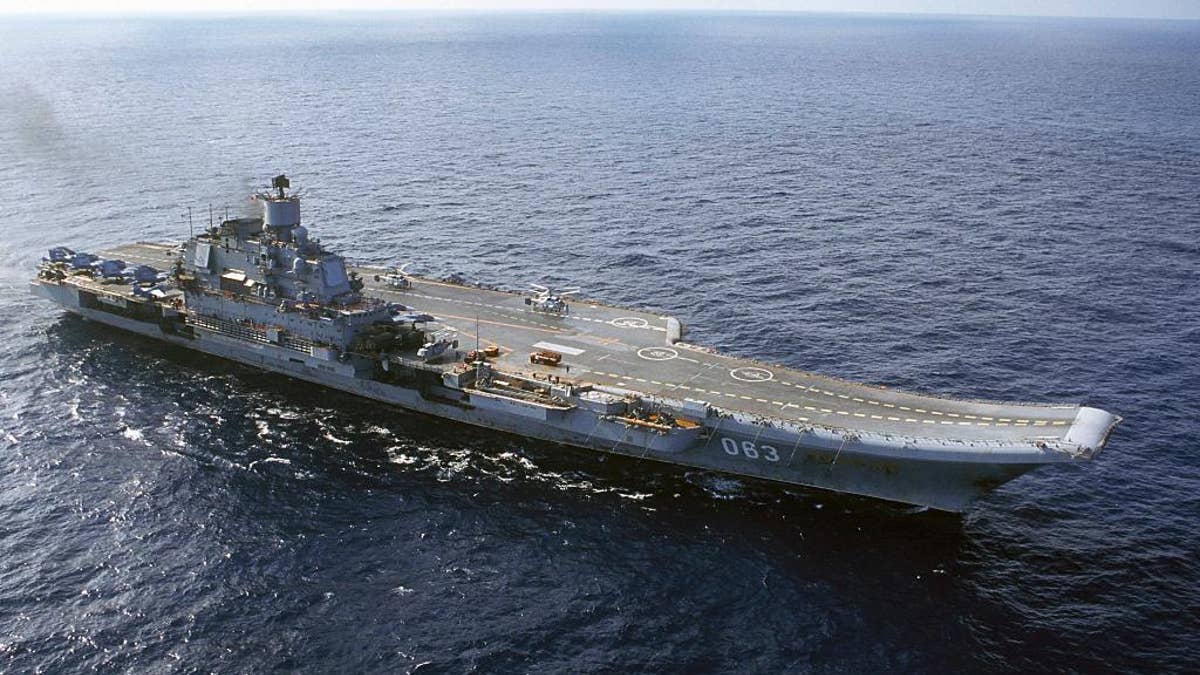
FILE - In this 2004 file photo the Admiral Kuznetsov carrier seen in the Barents Sea, Russia. Russian Defense Minister Sergei Shoigu said Wednesday, Sept. 21, 2016, that the navy will send its only aircraft carrier, the Admiral Kuznetsov, to the eastern Mediterranean to join other Russian ships deployed near the Syrian shores.(AP Photo, file) (The Associated Press)
MOSCOW – The Russian navy will send its sole aircraft carrier to the eastern Mediterranean as part of Moscow's efforts to reaffirm its influence in Syria and showcase its resurgent military might.
Defense Minister Sergei Shoigu said Wednesday that the Admiral Kuznetsov will sail to the eastern Mediterranean to join other Russian ships in the area. He didn't specify when the carrier will be deployed, but Russian media have earlier reported that the mission was planned for the fall.
The Soviet-built Admiral Kuznetsov, the only aircraft carrier in the Russian navy, has recently been re-equipped with new Su-33 and MiG-29K fighter jets. It carries about 40 aircraft and is smaller than U.S. aircraft carriers.
The ship is based in Sevoromorsk on the Kola Peninsula and is part of the Russian navy's Northern Fleet.
Russia has waged a year-long military campaign in Syria that has shored up President Bashar Assad and allowed his troops to seize some key ground. Last week, Moscow and Washington brokered a cease-fire in Syria, which is now teetering on the brink of collapse amid renewed fighting and Monday's attack on a humanitarian convoy.
Since Moscow launched its air campaign in Syria on Sept. 30, 2015, the military has used it to test its latest jets and missiles. In a demonstration of its new precision strike capability, Russian strategic bombers, surface ships and a submarine have repeatedly launched cruise missiles at targets in Syria.
By sending the Admiral Kuznetsov to Syria's shores, Russia would significantly beef up its forces there. It would also give the military a chance to test its carrier-born aircraft in combat for the first time.
In 2013, the Russian navy restored a constant presence in the eastern Mediterranean for the first time since the Soviet collapse, using the Soviet-era facility in the Syrian port of Tartus to replenish supplies.
Tartus is the only such facility the Russian military now has outside the former Soviet Union.
Shoigu pointed at the Cold War times, saying that the Soviet navy presence in the eastern Mediterranean helped protect Moscow's interests in the region.
"In 1967, the presence of the 5th squadron in the area helped prevent the escalation of the Arab-Israeli conflict and later served as an important deterrent against unfriendly actions against the Soviet Union," he said.
